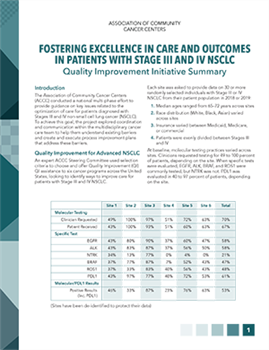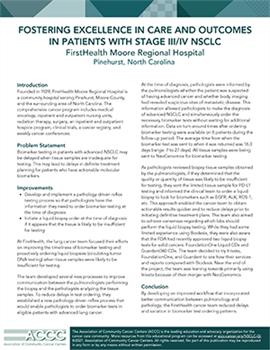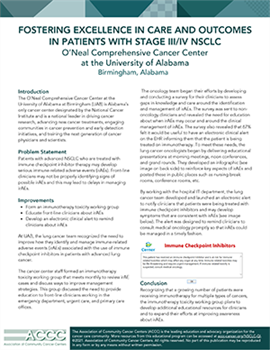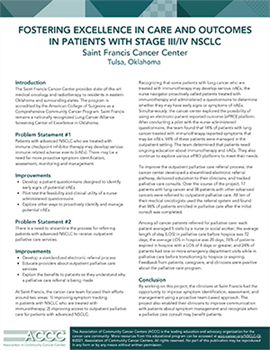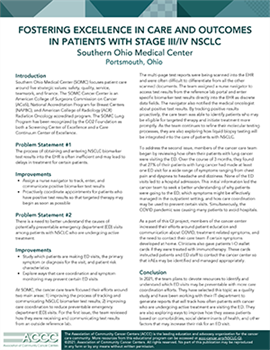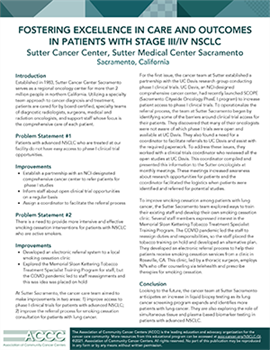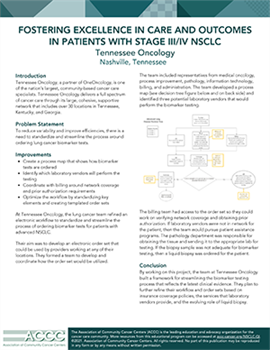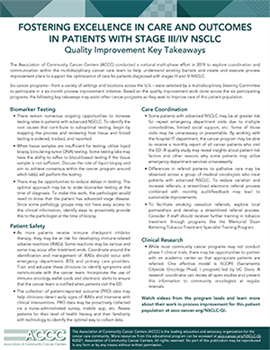Although more treatment options are now available for patients with locally advanced stage III and metastatic stage IV non-small cell lung cancer (NSCLC), fragmentation in the U.S. healthcare system can often impede consistent access to optimal care for these patients.
The Association of Community Cancer Centers (ACCC) conducted a national multi-phase effort to explore coordination and communication within the multidisciplinary cancer care team to help understand existing barriers and create and execute process improvement plans to support the optimization of care for patients diagnosed with stages III and IV NSCLC.
ACCC and its multidisciplinary Steering Committee disseminated a double-blind, national online survey in 2019 to its membership to assess how patients with stage III and IV NSCLC are diagnosed and managed. Six cancer programs—from a variety of settings and locations across the United States—were selected from the applicants to participate in a six-month process improvement initiative.
- Selected programs shared quality improvement (QI) topics of interest that were relevant to their sites. Full-day workshops were conducted where guest faculty presented educational lectures and participated in action planning with each multidisciplinary care team.
- The participating cancer programs submitted baseline data to inform the process of barrier identification and problem statement development.
- The programs started their process improvement initiative and provide follow up at one-, three-, and six-months.
- At the conclusion, data was analyzed, and an outcomes report was shared with each program. The participants can use these results to modify their approach and repeat QI within their sites.
The identified problem statements—and the improvements made—for the six participating cancer program participants are outlined on this page. A high-level summary of the six programs can be accessed below:
Watch the videos below to hear from ACCC study participants the benefits of participating in this quality improvement program, and details regarding how the changes were implemented. Download project specific data sheets from each site in order to replicate their study at your institution.
Providing quality cancer care requires ongoing cancer program assessment and improvement. Small changes can make a big impact on your patients. Use these ACCC tools and resources, and lessons learned from your peers to complete your own quality improvement projects.
FirstHealth Moore Regional Hospital
Pinehurst, NC
Biomarker testing in patients with advanced NSCLC may be delayed when tissue samples are inadequate for testing, which may lead to delays in treatment planning for patients who have actionable molecular biomarkers.
Learn how the FirstHealth lung cancer team developed an improved workflow that incorporated better communication between pulmonology and pathology, which reduced delays and variation in biomarker test ordering patterns.
The ACCC workshop helped us identify ways to expedite care for our patients. Molecular testing has become such a necessity to treat the stage III and stage IV patients, and to expedite that care, we developed a reporting sheet when we obtained pathology samples.
O’Neal Comprehensive Cancer Center at the University of Alabama
Birmingham, AL
The UAB lung cancer team recognized the need to improve how they identify and manage immune-related adverse events (irAEs) associated with the use of immune checkpoint inhibitors in patients with advanced lung cancer.
Hear how this project spurred the development of a new immunotherapy toxicity working group which plans to develop educational resources for clinicians and expand efforts to raise awareness about irAEs.
We quickly realized there was a big knowledge gap in understanding how immune checkpoint inhibitors are different from chemotherapy and come with their own side effects that are unique… education stood out as the first thing that we needed to do.
Saint Francis Cancer Center
Tulsa, OK
Patients with advanced NSCLC who are treated with immune checkpoint inhibitor therapy may develop serious immune-related adverse events. Hear how the Saint Francis cancer care team focused their efforts on symptom identification, assessment, monitoring, and management.
By working on this QI project, their clinicians also improved communications with patients and recognized when a palliative care consult may benefit patients.
This QI project was an impetus for helping us get our palliative care program initiated. We've had some great results: we reduced our emergency room visits by 45% and inpatient admission by 33.9%. The only difference was the implementation of [outpatient] palliative care.
Southern Ohio Medical Center
Portsmouth, OH
Since the process of obtaining and entering NSCLC biomarker test results into the EHR is often inefficient and may lead to delays in treatment for certain patients, the SOMC cancer care team focused on improving the process of tracking and communicating NSCLC biomarker test results.
Learn how they can better understand the causes of potentially preventable emergency department visits among patients with NSCLC who are undergoing active treatment and have focused efforts on care coordination to prevent unnecessary ED visits.
We learned that patients who visited the ED once were likely to go back—two to three and even four times—during the course of treatment. We knew those were going to be the high cost, preventable, high risk patients.
Sutter Cancer Center, Sutter Medical Center
Sacramento, CA
At Sutter Sacramento, the cancer care team aimed to make actionable improvements in two areas: 1) improve access to phase I clinical trials for patients with advanced NSCLC; 2) improve the referral process for smoking cessation consultation for patients with lung cancer.
Through the efforts accomplished in this QI project, their team anticipates an increase in liquid biopsy testing as its lung cancer screening program expands and identifies more patients with lung cancer.
A very important thing from our conversations with ACCC is identifying patients. One patient missed is one patient too many. Anyone who has a driver mutation should be found. We know that liquid biopsy can help increase the patients that we find.
Tennessee Oncology
Nashville, TN
To reduce variability and improve efficiencies, there is a need to standardize and streamline the process around ordering lung cancer biomarker tests.
Learn how the cancer care team at Tennessee Oncology refined an electronic workflow to standardize and streamline the process of ordering biomarker tests for patients with advanced NSCLC.
We recognized through this process that there were probably a dozen different ways you could order these [molecular] tests. We saw that if we could streamline that and decrease variability, we're going to increase our rate and speed of getting these tests done.
Conclusion
As a result of this project, six cancer programs identified ways to improve care for patients with stage III and IV NSCLC. Each cancer center focused on areas that were most relevant to their practice setting and found specific ways to incorporate the latest evidence and clinical practice guidelines. Process improvements were made to optimize biomarker testing, monitor patients for immune-mediated adverse reactions, and engage members of the cancer care team to increase palliative care and reduce unnecessary emergency department utilization. Several cancer programs found ways to improve their use of liquid biopsy testing in patients with advanced NSCLC and to reduce delays in testing. While the COVID-19 pandemic caused significant disruptions in care delivery, the participating sites remained committed to implementing changes around biomarker testing, care delivery, and symptom management.
Partner Organizations



This project was made possible by support from AstraZeneca.

To learn more about this education program, please visit the Fostering Excellence in Care and Outcomes in Patients with Stage III and IV NSCLC page.

